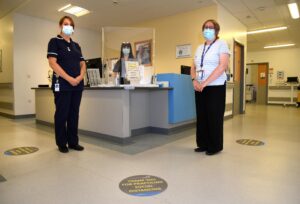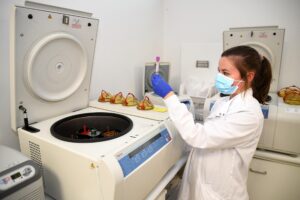SIR BOBBY ROBSON CANCER CENTRE RISES TO MEET COVID-19 CHALLENGE
The COVID-19 pandemic has created many challenges for the NHS and for some patients on clinical trials has even led to the cancellation of treatment.
Of the 18 early phase cancer clinical trials units nationally (ECMCs), only the Sir Bobby Robson Cancer Trials Research Centre at the Northern Centre for Cancer Care (Freeman Hospital, Newcastle) has been able to remain open continually throughout the COVID-19 crisis.
Professor Ruth Plummer, director of the Sir Bobby Robson Centre, explains: “The pandemic has been a worrying time for everyone and for cancer patients all the concerns have, unfortunately, been amplified with worry about their treatment too.
“Our Hospital Trust had to make some very difficult decisions at the beginning of this health crisis and thankfully allowed us to stay open. The Trust’s Research and Development assigned any COVID-19 trial as highest priority and some other medical trials were put on hold. However, as the Centre looks after patients who have limited treatment options, we’ve also ensured cancer trials remain a high priority.
“It’s been a difficult balance because hospital trusts were having to weigh up patient safety against non-treatment and many experimental cancer therapies can compromise the immune system and potentially put patients at greater risk of severe effects should they develop COVID-19.

(L-R) Helen Chambers (Oncology Research Sister), Kerrie Loring (Receptionist), Professor Ruth Plummer (Director Sir Bobby Robson Cancer Trials Research Centre)
“However, we were told we could stay open if we could do so safely. We’ve managed to do so and have even recruited new patients to trials. There are policies and procedures in place to keep staff and patients safe throughout the hospital and we’ve been able to continue to provide our services.”
Patients and staff at the Sir Bobby Robson Centre work closely together to improve the treatment and diagnosis of cancer and study the effects of new drugs.
It offers cancer patients, like Sir Bobby who was one of the first people to receive treatment there, access to early drug trials and potential new treatments. These include immunotherapy drugs that are proving very effective for some cancers, which would otherwise be extremely difficult to treat.
During 2019, there were 64 trials open at the Sir Bobby Robson Centre. This year, 44 new studies have opened and 199 new patients recruited to trials.
Professor Plummer adds: “We manage to see most patients face-to-face but have done some telephone meetings and sent drugs out in tablet form when appropriate.
“And we asked patients, if they weren’t attending for scan results, if they could come without a visitor to reduce the number of people in the hospital. It’s not been easy to change this element of our work because the feedback we receive from patients and the news we give them is so personal and important.
“Obviously, the team here are wearing PPE and some have been homeworking and coming into the unit early, late or at the weekends so there are fewer people here at any one time to enable social distancing.
“The clinical side have managed to keep our normal patient hours and everyone has been additionally careful outside of work. Everyone here knows the importance of these trials and is committed to keeping them going. I’m very proud of them all.”
Sir Bobby launched his Foundation in 2008, initially to raise £500,000 to equip the Sir Bobby Robson Centre and, thanks to your fantastic support, we continue to fund a specialist research nurse and research doctor there.




